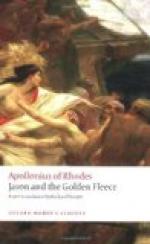Who was the next that died? For then a second time the heroes heaped up a barrow for a comrade dead. For still are to be seen two monuments of those heroes. The tale goes that Tiphys son of Hagnias died; nor was it his destiny thereafter to sail any further. But him there on the spot a short sickness laid to rest far from his native land, when the company had paid due honours to the dead son of Abas. And at the cruel woe they were seized with unbearable grief. For when with due honours they had buried him also hard by the seer, they cast themselves down in helplessness on the sea-shore silently, closely wrapped up, and took no thought for meat or drink; and their spirit drooped in grief, for all hope of return was gone. And in their sorrow they would have stayed from going further had not Hera kindled exceeding courage in Ancaeus, whom near the waters of Imbrasus Astypalaea bore to Poseidon; for especially was he skilled in steering and eagerly did he address Peleus:
“Son of Aeacus, is it well for us to give up our toils and linger on in a strange land? Not so much for my prowess in war did Jason take me with him in quest of the fleece, far from Parthenia, as for my knowledge of ships. Wherefore, I pray, let there be no fear for the ship. And so there are here other men of skill, of whom none will harm our voyaging, whomsoever we set at the helm. But quickly tell forth all this and boldly urge them to call to mind their task.”
Thus he spake; and Peleus’ soul was stirred with gladness, and straightway he spake in the midst of all: “My friends, why do we thus cherish a bootless grief like this? For those two have perished by the fate they have met with; but among our host are steersmen yet, and many a one. Wherefore let us not delay our attempt, but rouse yourselves to the work and cast away your griefs.”
And him in reply Aeson’s son addressed with helpless words: “Son of Aeacus, where are these steersmen of thine? For those whom we once deemed to be men of skill, they even more than I are bowed with vexation of heart. Wherefore I forebode an evil doom for us even as for the dead, if it shall be our lot neither to reach the city of fell Aeetes, nor ever again to pass beyond the rocks to the land of Hellas, but a wretched fate will enshroud us here ingloriously till we grow old for naught.”
Thus he spake, but Ancaeus quickly undertook to guide the swift ship; for he was stirred by the impulse of the goddess. And after him Erginus and Nauplius and Euphemus started up, eager to steer. But the others held them back, and many of his comrades granted it to Ancaeus.
So on the twelfth day they went aboard at dawn, for a strong breeze of westerly wind was blowing. And quickly with the oars they passed out through the river Acheron and, trusting to the wind, shook out their sails, and with canvas spread far and wide they were cleaving their passage through the waves in fair weather. And soon they passed the outfall of the river Callichorus, where, as the tale goes, the Nysean son of Zeus, when he had left the tribes of the Indians and came to dwell at Thebes, held revels and arrayed dances in front of a cave, wherein he passed unsmiling sacred nights, from which time the neighbours call the river by the name of Callichorus[1] and the cave Aulion.[2]




